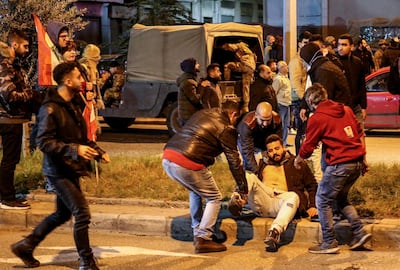There have been two broad interpretations of how the Lebanese armed forces have behaved in the ongoing protests in Lebanon. Both are inaccurate and both fail to understand what really drives the country’s military.
One interpretation – that held by many protesters – is that the army has protected demonstrators and, within the limits imposed by the sectarian political system, has supported their demands. The second, advanced by politicians and pundits on the political right in the US who support Israel, is that the armed forces are a facade for Hezbollah. Even a cursory look at what has taken place in Lebanon in the past six weeks disproves both narratives.
While the army has defended demonstrators in many places, it has also done more than that. Protesters have been detained and even mistreated in some locations. Earlier this week, for example, soldiers forcibly removed demonstrators blocking a main coastal road. At other times, the army has stood by while thugs associated with Hezbollah and the Amal Movement attacked protesters and destroyed their camps. This surely does not suggest that the military is explicitly on the side of the uprising.
On the other hand, the armed forces have definitely not been taking orders from Hezbollah. Where the political class had expected troops to break up protests using force, in fact the military strenuously avoided taking such a radical step. This earned it criticism from the two main Shiite parties, Hezbollah and Amal, underlining how the armed forces pursue their own agenda.
The reality is much simpler. Lebanon’s armed forces are a reflection of the country's sectarian society, with all its disagreements. To reduce the pressures this might place on the organisation, it has long adopted a corporate identity over and above sectarian divisions. This identity has been focused on preserving the institution and managing its underlying contradictions from within.
What has this meant in terms of Hezbollah? While the party has allies in the army, Hezbollah is not in a position to compel the military to act in a certain way, nor are any of its branches fully under its sway. Rather, the armed forces are made up of myriad interest groups that seek to preserve the status quo from which they benefit, by avoiding a clash among themselves for the greater benefit of the organisation. Some might engage with Hezbollah, others might not. But the different sides will not threaten military unity by turning this into a matter of internal discord.
The principal motives explaining the military’s behaviour in the Lebanon protests have been threefold – to avoid being drawn into the political divisions that the uprising has exacerbated, to retain popular support while portraying the military as a supranational institution free from corruption, and to protect public institutions but without doing so in a way that threatens public support.
In many regards, the model to which the armed forces continue to adhere is that put in place by independent Lebanon’s first armed forces commander, Fouad Chehab. In 1952, there was a political crisis when then president Bishara Al Khoury resigned under pressure from his political foes. At the time, Chehab had shielded the military from the political disputes, agreeing only to head an interim government until a successor to Al Khoury could be elected.
In 1958 another political crisis came about when Camille Chamoun sought to use manipulated elections to extend his presidential term. What ensued was a shortlived civil war in which Chehab again kept the army on the sidelines while it actively prevented any one side from gaining a decisive advantage. By playing the role of arbitrator, Chehab not only safeguarded the military institution, he also gained enough trust to be elected president to succeed Chamoun.
The paradox is that while army commanders will strenuously avoid politicising the armed forces, many have had the ambition to become president. In the past two decades, three former armed forces commanders have been president. The current commander Joseph Aoun might well have a similar ambition.
That could partly explain why he has been so keen to preserve the neutrality of the armed forces and avoid alienating the public. Mr Aoun does not want to engage in repression of the population, particularly as its demands are entirely justified. Moreover, he certainly does not want to do so on behalf of a discredited political class, whose number includes the controversial figure Gebran Bassil, the son-in-law of Lebanese President Michel Aoun and a presidential hopeful.

There is an illusion among some Lebanese that the armed forces represent a solution to the current political crisis. With politicians’ reputations in tatters because of the way they have plundered the state, the notion that the military can successfully take over power is dangerous. Not only would it undermine everything the military has tried to do since the protests began, it would go against the balancing game that has long allowed it to overcome its paradoxes.
That’s why it is a mistake for opponents of the protests to try to enrol the military in the suppression of demonstrators, and it is why trying to punish the military for being an alleged Hezbollah cat's paw is reckless. Lebanon’s military, like most national institutions embodying unity in otherwise divided states, is a reflection of Lebanon itself. Its survival often means embracing uneasy inconsistencies.
Michael Young is editor of Diwan, the blog of the Carnegie Middle East programme, in Beirut


